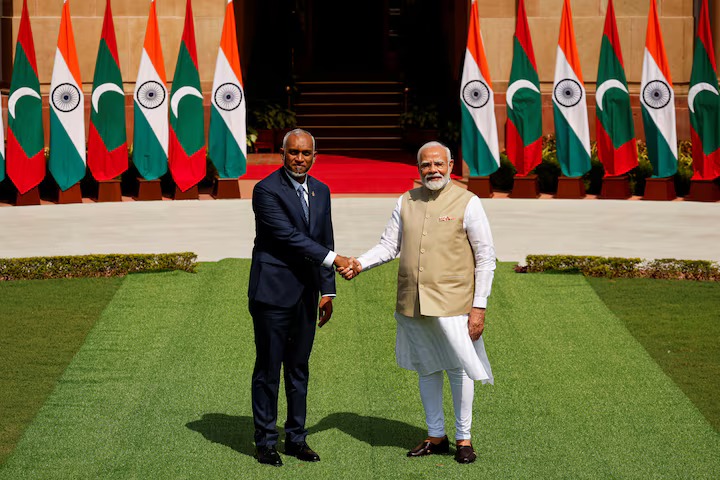In 2023, the Maldives’ political landscape shifted dramatically when Mohammad Muizzu’s party, the People’s National Congress (PNC), rose to power, riding the wave of the “India Out” rhetoric. Initially supported by criminal groups, drug traffickers, and religious hardliners, this anti-India stance was also embraced by the opposition, owing to long-standing ties with these entities. The political discourse blended anti-India sentiments with religious rhetoric, gaining momentum through both social media and traditional outlets, largely driven by the Progressive Alliance. Behind the scenes, China’s influence subtly shaped these movements, with the ultimate goal of undermining India’s presence in the region and advancing a pro-China agenda.
However, a striking shift in the Maldives’ foreign policy emerged in early 2025. Against the backdrop of Muizzu’s administration, which once vocally opposed India, the foreign and defense ministers of the Maldives made high-profile visits to New Delhi, signaling a change in approach towards India.
A Softening Stance Towards India Amid Crisis
Early in Muizzu’s tenure, anti-India rhetoric soared, peaking with comments from Maldivian ministers mocking Indian Prime Minister Narendra Modi. This sparked calls for boycotting Maldivian tourism in India, leading to a sharp decline in Indian tourist arrivals. Muizzu’s administration initially retaliated, accusing India of bullying. Yet, as the Maldives faced a deepening fiscal crisis and China’s promised support failed to materialize, the administration was forced to reconsider its position.
By early 2025, the government began to soften its stance, recognizing the importance of rebuilding relations with its traditional neighbour. A landmark moment came in January when Foreign Minister Abdulla Khaleel visited India, signaling a closing of the chapter on hostilities that had persisted through much of 2023 and 2024. India responded positively, offering crucial financial assistance to the Maldives.
India’s Role in Restoring Stability
In June 2024, Muizzu attended Indian Prime Minister Narendra Modi’s third-term inauguration, marking a diplomatic thaw between the two countries. This was followed by a state visit to New Delhi in October, where India extended two currency swap deals worth $760 million to help the Maldives manage its mounting external debt. During this visit, India also agreed to initiate talks on a Free Trade Agreement (FTA) focused on goods and services, further strengthening economic ties.
Meanwhile, global financial institutions such as the World Bank and Moody’s have raised alarms about the Maldives’ growing fiscal vulnerabilities, with rising public debt and fiscal spending as key concerns. With reserves dangerously low, the Maldives faces ongoing challenges in securing sufficient financial support to stabilize its economy.
The China-Maldives FTA: New Economic Frontiers
In contrast, the Maldives has also pursued trade agreements with China, reviving the China-Maldives Free Trade Agreement (FTA) as part of Muizzu’s plan to diversify the country’s economic ties. The FTA, which officially took effect on January 1, 2025, marks the first free trade deal for the Maldives. Further cementing ties, the Maldives also signed a trade pact with Turkey in 2024, which reduces tariffs on both sides.
However, these trade deals have raised concerns domestically and internationally. Critics, particularly from the opposition MDP, argue that the China-Maldives FTA could lead to significant revenue losses for the government, as the Maldives relies heavily on import duties. With 95% of essential commodities imported, the Maldives could face economic strain as it becomes more dependent on duty-free Chinese goods.
Economic Minister Mohamed Saeed has defended the agreements, claiming the shortfall in import duties will be offset by other state revenues, such as taxes from businesses that benefit from the trade deals. Nevertheless, the long-term fiscal impact of these agreements remains uncertain.
India’s Concerns and the Economic Outlook
India has expressed concerns over these recent trade pacts, fearing they could further strain the Maldives’ already fragile economy. With the Maldives’ economy grappling with low foreign exchange reserves and external debt, the new trade deals risk exacerbating its balance of payments deficit, especially with China, one of the country’s key suppliers. The loss of customs duties and the potential for supply chain disruptions raise alarms about the country’s financial stability.
As the Maldives navigates these complex diplomatic and economic waters, it remains to be seen how the balancing act between China and India will play out in the coming months, especially as the country continues to face significant economic challenges.

